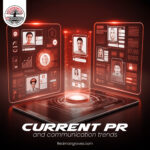Building strong media relations is a cornerstone of successful public relations (PR) and crisis communication strategies. For PR agencies in the UAE, where media landscapes are diverse and rapidly evolving, cultivating meaningful relationships with journalists, editors, and media influencers is crucial for enhancing brand visibility and credibility. Strong media relations not only ensure positive coverage but also provide a reliable platform to communicate effectively during a crisis. Here are some essential tips for PR and crisis communications agencies to build and maintain strong media relations.
1. Understand the Media Landscape
To build strong media relations, it’s vital to have a thorough understanding of the UAE media landscape. This includes knowing the leading newspapers, magazines, TV channels, radio stations, online news portals, and influential bloggers. Identify the key players in each sector and understand their audience, content style, and editorial preferences. This knowledge will help you tailor your pitches and approach, ensuring that you target the right journalists and media outlets for your clients.
2. Develop Personalized Pitches
Journalists receive countless pitches daily, so it’s important to make yours stand out. Generic, mass-distributed press releases are unlikely to gain attention. Instead, focus on developing personalized pitches that are relevant to the journalist’s beat and interests. Demonstrate that you’ve done your homework by referencing their recent work and explaining why your story is a perfect fit for their audience. A personalized approach shows respect for the journalist’s time and increases the likelihood of positive coverage.
3. Build Genuine Relationships
Media relations go beyond just sending press releases and pitches. To build strong, lasting relationships with journalists, you need to invest time in getting to know them personally. Attend industry events, networking sessions, press conferences, and media briefings where you can meet journalists face-to-face. Engage with them on social media by sharing and commenting on their articles, providing valuable insights, and showing genuine interest in their work. Remember, media relations are built on trust and mutual respect.
4. Provide Value and Be a Reliable Source
To become a go-to source for journalists, always provide valuable, accurate, and timely information. Be proactive in sharing news, insights, and expert opinions that align with their interests. During a crisis, ensure that your agency provides clear, concise, and reliable information to help journalists report accurately. Establish yourself as a credible resource by delivering high-quality content, being responsive to media inquiries, and meeting deadlines. Journalists value reliability and will be more likely to turn to you for future stories.
5. Create Compelling Content
Journalists are always looking for compelling stories that will engage their readers. As a PR agency, it’s your responsibility to craft content that is newsworthy, interesting, and relevant. Focus on creating press releases, feature stories, op-eds, and thought leadership pieces that offer a unique angle or new insights into a topic. Include multimedia elements like high-resolution images, infographics, and videos to make your content more attractive and shareable.
6. Be Transparent and Honest
Transparency and honesty are critical in media relations, especially during a crisis. When dealing with journalists, always provide accurate information and avoid exaggeration or spinning the truth. If you don’t have an answer to a question, be honest about it and offer to follow up with the necessary information. Maintaining integrity in your interactions with the media helps build long-term trust and credibility, which is invaluable for any PR agency.
7. Stay Updated and Be Proactive
The news cycle moves fast, and staying updated on current events, industry trends, and emerging stories is essential. Use media monitoring tools to track relevant news and stay ahead of potential opportunities or crises. Being proactive in offering commentary or expert opinions on trending topics can position your clients as thought leaders and provide valuable content for journalists on a tight deadline.
8. Follow Up, But Don’t Be Pushy
Following up on your pitches and press releases is crucial, but it’s equally important to strike the right balance. If you don’t receive a response to your initial email, wait a few days before sending a polite follow-up. Avoid being overly persistent, as it can come across as pushy and damage your relationship with the journalist. Instead, focus on maintaining a professional and respectful tone, expressing your genuine interest in their work.
9. Provide Media Training for Spokespersons
Effective media relations also depend on how well your client spokespersons communicate with the media. Provide media training sessions to help spokespersons understand how to deliver key messages, handle tough questions, and maintain composure during interviews. A well-prepared spokesperson can significantly enhance media coverage and help build stronger relationships with journalists.
10. Show Appreciation A little appreciation can go a long way in building strong media relations. Always thank journalists for their time and coverage, whether it’s a short thank-you note, a shout-out on social media, or an invite to an exclusive event. Showing gratitude not only strengthens your relationship but also sets a positive tone for future interactions.




